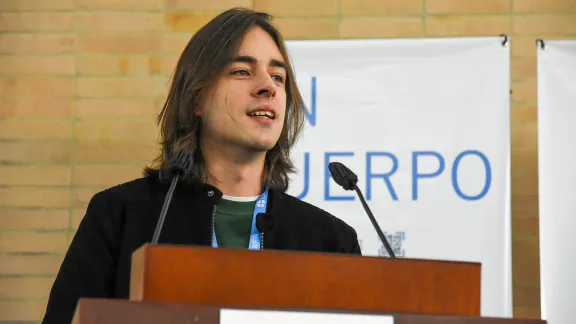In this Voices from the Communion, Natan Schumann, coordinator of the National Council of Evangelical Youth in Brazil, shares his hopes for the LWF’s upcoming Assembly in Krakow which he will attend as youth delegate for his church

Natan Schumann, coordinator of the National Council of Evangelical Youth in Brazil. Photo: LWF
Voices from the Communion: Natan Schumann, Assembly youth delegate for the church in Brazil
(LWI) - A passionate supporter of the Evangelical Youth network in his native Brazil, Natan Schumann will be a youth delegate from his church to the Lutheran World Federation (LWF) Thirteenth Assembly in Krakow, Poland, in September.
Born in the town of Sapiranga in southern Brazil where his family has lived for several generations, he was baptized into the Evangelical Church of the Lutheran Confession in Brazil (IECLB). His parents, who were not regular Sunday worshippers, were initially surprised by his interest and involvement in the life of the church, sparked by his participation in confirmation classes as a teenager.
But gradually his enthusiasm and his commitment to the Evangelical Youth movement had a positive influence on the rest of his family, who began to accompany him to worship services and other activities. Even after he moved to Porto Alegre to pursue studies in international relations, they continued to support his involvement and encouraged him to follow his passion, alongside his academic goals.
As well as preparing for the Krakow Assembly, Natan, as coordinator of the National Council of Evangelical Youth (CONAJE) is busy with plans for the next national congress which will take place next July in Domingos Martins, a town in the state of Espírito Santo. He is excited about the way this biennial event enables youth from across the country to forge stronger ties and to strengthen their witness to their Christian faith in an increasingly secular society in Brazil.
Alongside your role with the church in Brazil, you were also a member of the LWF delegation to the COP conference in Glasgow in 2021 - what motivates you most in your work at both national and global level?
What gives me most hope is to see young people welcomed and recognized for their work alongside people of other generations. It encourages me when I see you youth assigned important and representative roles, not only because they fulfill quotas, but because the community has faith in their gifts and their potential to serve God by assuming leadership roles. I enjoy working together with people from all generations and I learn from the experiences they share. I dream of a church where relationships between different generations are based on mutual respect and broader cooperation.
What are your expectations as you look ahead to the LWF 13th Assembly?
I am excited to represent the IECLB at this Assembly. In our communities, young people play a vital role in the daily building up of the church. We want to convey the idea that young people are not only the future, but also the present of the Church. I hope that this Assembly will be a space to reflect and promote greater recognition of youth leadership in LWF decision-making.
Encouraging youth participation has been a priority for the LWF for several decades since the 1984 Assembly - what do you see as the current challenges?
Despite the progress made, we still face challenges in youth participation, also within the Lutheran churches in our Latin America and Caribbean region. More work is needed to increase youth participation and ensure that their voices are heard at all levels of the LWF.
At the Pre-Assembly of the Americas, it was agreed to present a proposal to formulate an intergenerational justice policy for the LWF, based on biblical-theological principles. This proposal aims to ensure that decision-making processes are inclusive and fair to all generations, promoting dialogue, collaboration and mutual learning. We hope that this proposal will be considered and that concrete measures will be put in place to move towards greater intergenerational justice in the LWF.
What impact do you think the Assembly can have in promoting stronger youth leadership?
The LWF has already succeeded in meeting the youth quota in terms of registered participants globally for the Krakow Assembly, which is encouraging. It is an important step in ensuring that youth voices are heard at this global event. Intergenerational justice and youth leadership will be an important part of the discussions and we look forward to promoting greater youth engagement and participation in all levels of decision-making. With this Assembly, the LWF reaffirms its commitment to build a united body, strengthened by the spirit of hope, where all generations have a voice and feel represented in the global Lutheran community.
What does it mean for you and your church to be a part of the global communion of churches?
I would like to emphasize the importance of continuing to work together, churches and youth, to promote inclusive leadership and stronger intergenerational justice. We need to create spaces where generations meet, listen and learn from each other. The diversity of experiences and perspectives enriches the Church and helps us face today's challenges. I hope that this Assembly will be a starting point for greater youth participation in the LWF and greater attention to intergenerational justice in our global Lutheran community.
Voices from the Communion
The Lutheran World Federation is a global body that shares the work and love of Christ in the world. In this series, we profile church leaders and staff as they discuss topical issues and set out ideas for building peace and justice in the world, ensuring the churches and communion grow in witness and strength


